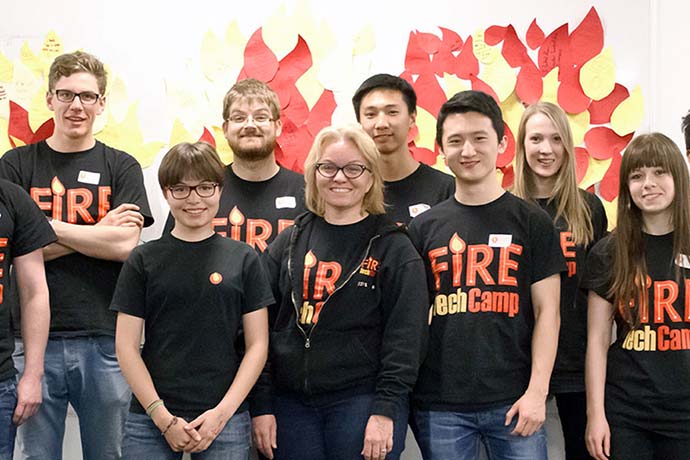Jill also is a great example of someone using technology to help kids and teachers learn about coding and computer science.
Tim: What prompted you to start Fire Tech?
Jill: I’m American, based in the UK since 1996 and my kids are being brought up here in London. During the school holidays I would look for activities for the kids and really struggled to find good enrichment activities. One summer when they were visiting their grandparents in the States they attended a tech camp and were so inspired. I decided to start something here that would help kids learn technology not only for its own sake, but as a way to be creative and express themselves. So I launched Fire Tech Camp in April 2013 with courses in Video Game Development, Mobile App Design and Robotics and it’s grown from there!
Tim: How did your professional background help you start Fire Tech?
Jill: My background wasn’t in education or coding – on the one hand I’ve had a steep learning curve but I think that has also given me a very different perspective on the issue from people who have spent a long time in education. I have a pretty eclectic professional background (consulting, finance, marketing), but the thing that I’d always liked most in my old jobs was building something myself or supporting entrepreneurs. I’ve had my own businesses and entrepreneurial projects before, so I knew what I was getting into!
Tim: What’s the most fun you’ve had with launching and running the camps?
Jill: I find this work incredibly fun. I love checking out the new platforms and technologies that we can use in our classes – and in my opinion there has never been a more exciting time, especially in physical computing and electronics. The Arduino platform let’s everyone be an inventor, and things like Circuit Stickers and Bare Conductive inks and boards make it quick and fun to figure out how to use sensors and outputs. I also really love what we do in Rapid Prototyping. The kids get incredibly excited when they see something that they’ve created on a screen come to life through 3D printing or laser cutting. It’s been super gratifying to be able to bring the digital and physical making to the kids and also to see how happy their parents have been with their work.
Tim: Can you describe how FireTech courses teach computer in a creative project-based way? How do people respond?
Jill: All of our courses are run in small groups, with a focus on the kids have ownership of their projects. We don’t want it to feel like traditional school. Ownership means that the students design the look and feel of their projects – take the example of a video game. They get to decide where they want to focus their work – some kids love to design very slick graphics, others use simple graphics and spend more time creating more advanced game play. We want to encourage them in exploring the parts that are the most interesting to them, and provide them the help and support to be sure that they have a working game at the end of the week. They get to build the game that they want – within the bounds of good taste! – with a strong pedagogical framework, lots of support, and plenty of creative freedom. Our goal is for them to leave feeling proud of what they’ve accomplished and hungry to learn more.
Tim: What’s next with your camps?
Jill: We are working very hard to expand throughout the UK. We launched last year in Manchester, Bristol and Brighton and we are planning launches in Leeds, Reading and Cambridge this summer. We’re adding new courses all the time – currently we are adding more advanced coding courses for teens, and we are looking at additional kinds of games development classes, as those are the most popular with the under-12s.
Tim: What is your background? How did you land in Europe?
Jill: I’m originally from Atlanta, Georgia and I went to Paris after University. I was dying to learn French and experience Europe! I went home to the US for business school, but came back to Europe the first chance I got. I love the languages, the proximity to so many cultures and great cities. I spent four years in France, and four in Italy and the balance in the UK. I think London is the most exciting city in the world right now and I love bringing something that I think has worked well in the States to my adopted country.
Tim: Are your husband and kids involved and, if so, in what roles? Do they like helping?
Jill: My husband is very supportive thank goodness as there are times when the house has been full of laptops, camp equipment, and all manner of Arduinos, and circuits, not to mention all those university students eating pizza during training! My kids are my inspiration and my guinea pigs and they are very involved. They’ve taken most all of the courses for their ages and they give me feedback and new ideas. They loved the 3D printing classes, but told me I needed to switch up the snacks more and improve my music playlist! I think it’s been fun for them to see Fire Tech grow from the ground up, and they might even be a little bit proud of me (or at least the fact that I can talk to their friends about video games and 3D Printing).

